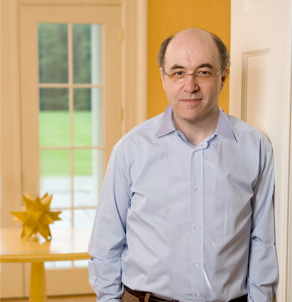Podcast: Play in new window | Download | Embed
 Yesterday I was privileged to have an hour long phone interview with Dr. Stephen Wolfram for my Singularity 1 on 1 podcast.
Yesterday I was privileged to have an hour long phone interview with Dr. Stephen Wolfram for my Singularity 1 on 1 podcast.
We started our conversation on how Stephen got interested in exploring science in general and eventually focused on computation in particular. Then we moved on to a number of other interesting topics such as his work on Mathematica, his monumental book A New Kind of Science![]() , his unique computational search engine Wolfram|Alpha, artificial intelligence and the technological singularity.
, his unique computational search engine Wolfram|Alpha, artificial intelligence and the technological singularity.
I have to say that after spending 2 or 3 days in intense preparation for the interview I already knew that Dr. Wolfram is an exceptionally intelligent person. However, after our conversation and especially after taking into consideration Wolfram’s breadth and depth of work, and the profound actual and potential implications thereof, it seems to me that he may be considered to be arguably among the smartest people alive. Anyway, this is my own impression but I’ll let you be the judge yourself. So go ahead, listen to or download the audio above and don’t hesitate to let me know what you think…
Who is Stephen Wolfram?
Dr. Wolfram was born in London and educated in Eton, Oxford and Caltech, where at the age of 20 he was the youngest Ph.D. graduate in theoretical physics. He is a distinguished scientist, inventor, author, and entrepreneur. Wolfram is the creator of Mathematica, the author of A New Kind of Science, the creator of Wolfram|Alpha, and the founder and CEO of Wolfram Research.
Related articles












 Singularity Weblog is a journal of Nikola Danaylov's thoughts on trends, news, issues and people related to the
Singularity Weblog is a journal of Nikola Danaylov's thoughts on trends, news, issues and people related to the 
